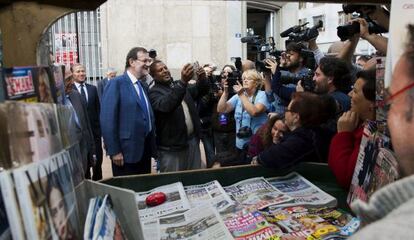Campaigning kicks off for most open election since return to democracy
With 16 days to go until Spaniards vote, the only clear thing is end of two-party system

Official campaigning for the most wide-open general election since the restoration of democracy in the 1970s got underway across Spain on Friday morning.
With 41 percent of voters still undecided, the only thing that seems clear is that the two-party system in place since the Transition will give way to a more fragmented scenario where two or even three parties will have to reach deals.
This time, the incumbent Popular Party (PP) and the main opposition Socialists (PSOE) are facing a serious challenge from two emerging parties that have made the fight against institutionalized corruption their leitmotiv: the pro-market Ciudadanos and the leftist Podemos.
If successful, either Rivera or Iglesias could end up playing kingmaker in the new parliament
Incumbent Prime Minister and PP leader Mariano Rajoy, 60, looks poised to win re-election on the strength of the economic recovery, but stands to lose around a third of his parliamentary presence and knows that he will need to secure support from another party to form a government.
Socialist leader Pedro Sánchez, 43, is feeling the pressure from the new challengers, who are both taking votes away from his party.
Meanwhile, both Albert Rivera, 36, of Ciudadanos and Pablo Iglesias, 37, of Podemos have 16 days left to convince voters that they represent a much-needed generational change in Spain. If successful, either one could end up playing kingmaker in the new parliament that emerges from the December 20 vote.
On November 30, three of the four main contenders faced off in a debate organized by EL PAÍS. The one conspicuous absence was Rajoy, who avoided the new format – multiple participants, questions from the audience – in favor of a traditional television interview on a private network.
The incumbent’s aides have prepared a non-risky campaign trail for him, with rallies in medium-sized cities, conventional interviews, and one single face-to-face debate with one challenger, Socialist leader Sánchez.
In fact, the conservative party very much wants its traditional rival to perform well at the election: PP campaign aides have admitted that a dismal result for the Socialists would pose a real problem for Rajoy, as it would mean that Ciudadanos will have become Spain’s second-largest force.
Sources at La Moncloa prime minister’s residence fear that Rivera might attempt to form a government of his own with support from other parties.
Meanwhile, at Socialist headquarters, the official line is one of optimism, but privately officials admit that the amount of votes that Ciudadanos and Podemos are taking away is hurting them. The PSOE is hoping to obtain more than 100 seats in Congress, but knows it could end up with far fewer than the 110 it won in 2011.
Over at Ciudadanos, the feeling of euphoria is so great that there are days when it feels it will beat not just the Socialists but also the PP, regardless of what the voter surveys are saying. The party’s strong performance at the Catalan elections in September, where it was the second most-voted force, and the momentum it has since gained in the polls, all suggest a good showing on December 20. And Rivera will also win if he comes in third, as he would become a necessary associate for either one of the big parties.
At Socialist headquarters, the official line is one of optimism, but privately officials admit that Ciudadanos and Podemos are hurting them
At Podemos, Pablo Iglesias is still hopeful that he can take the top spot on the podium even though he has been trailing behind Ciudadanos for months. But he continues to have faith in his own rhetorical abilities, which he showcases frequently in debates and on panel discussions. The party has presented a social democratic program in order to better challenge the PSOE, but Iglesias knows his group’s swift mutation from radical leftists who used to call themselves “the sister party to Syriza in Greece” to socialism could damage his credibility.
Most meaningful of all, surveys show that for the first time in history, the winner will get less than 30 percent of the vote and the third candidate will get more than 10 percent, which also means that this campaign will be truly be decisive in the election outcome.
English version by Susana Urra.
Tu suscripción se está usando en otro dispositivo
¿Quieres añadir otro usuario a tu suscripción?
Si continúas leyendo en este dispositivo, no se podrá leer en el otro.
FlechaTu suscripción se está usando en otro dispositivo y solo puedes acceder a EL PAÍS desde un dispositivo a la vez.
Si quieres compartir tu cuenta, cambia tu suscripción a la modalidad Premium, así podrás añadir otro usuario. Cada uno accederá con su propia cuenta de email, lo que os permitirá personalizar vuestra experiencia en EL PAÍS.
En el caso de no saber quién está usando tu cuenta, te recomendamos cambiar tu contraseña aquí.
Si decides continuar compartiendo tu cuenta, este mensaje se mostrará en tu dispositivo y en el de la otra persona que está usando tu cuenta de forma indefinida, afectando a tu experiencia de lectura. Puedes consultar aquí los términos y condiciones de la suscripción digital.









































